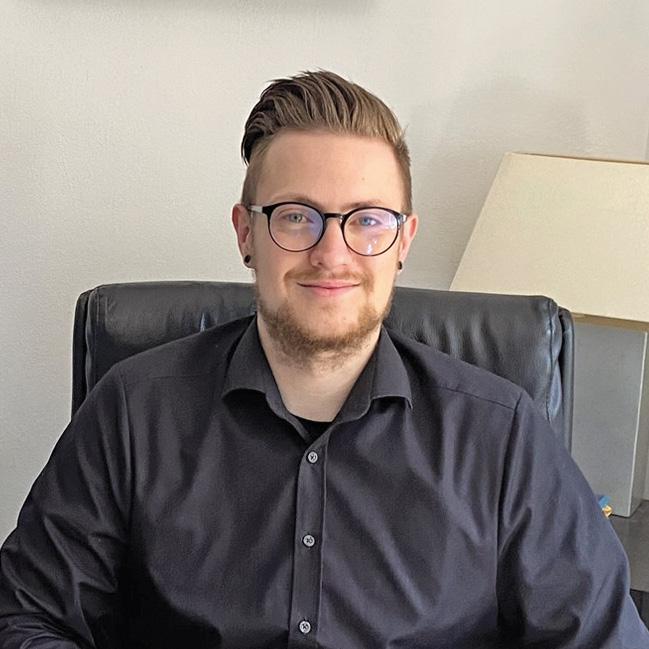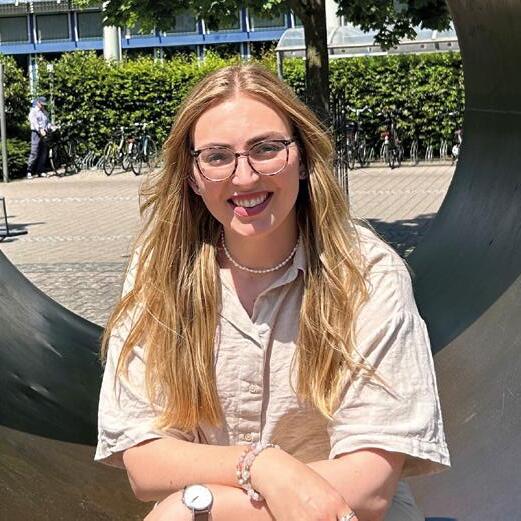
4 minute read
The desire for applied research
from "foresee - recognising signs, devising solutions, shaping the future", Annual Report of H-BRS 2022
Since November 2022, the universities of applied sciences (UAS) in NRW have the independent right to confer doctorates. This has been a long struggle – now the UAS in NRW can conduct doctoral procedures and confer doctoral degrees without cooperating with a traditional university. What the universities of applied sciences celebrated as a “landmark occasion” and a “milestone” has far-reaching consequences for doctoral students. What changes for them? How do they experience the new legal situation? Three doctoral students from H-BRS recount their journey.
“I want to conduct applied research”
“After completing my Master‘s degree in mechanical engineering at H-BRS, I started working as a development engineer in the research and development department of Rikutec in 2018. My enthusiasm for practical research never waned, and even after graduation I continued to stay in close contact with my H-BRS professors. I was considering the idea of earning a doctorate for a while, but a cooperative doctorate with a traditional university was out of the question for me. I want to conduct applied research and tackle social challenges in a concrete way. After the universities of applied sciences were awarded the right to confer PhDs in November 2022, Professor Dirk Reith and Professor Olaf Bruch convinced me to pursue an industry-based doctorate at H-BRS. The conditions are ideal for me. I work on an application-focused research topic both at H-BRS and in my company in an environment that is familiar to me. I am working on analysing the ageing process of plastics. The aim is to be able to foresee material behaviour more accurately during product use so that, long-term, plastic products with a longer useable life span can be produced.”
Daniel Grotenburg has been conducting research for his industry-based doctorate both at H-BRS and at Rikutec Richter Kunststofftechnik on the topic of ageing processes in plastics since October 2022.
“Exchange with other UAS doctoral students beneficial”
“I came to H-BRS from Egypt in 2014 to earn my Master‘s degree in autonomous systems. After my Master‘s degree, my supervisor Professor Martin Müller encouraged me to apply for a PhD so that we could continue researching explainable machine learning methods for multi-agent systems together. At that time, the new right of universities of applied sciences to confer doctorates was not yet in force, so I had to enrol for a cooperative doctorate. Shortly after I started my doctorate, the COVID crisis hit. This meant that I was unable to complete the cooperative doctorate with the University of Augsburg as planned. Due to the COVID restrictions, I was very limited in my research, and to top it off, the bureaucratic hurdles that a cooperative doctorate entails were even higher due to the crisis. That was extremely frustrating for me. Because of this experience, I decided to make a change. The new right for UAS to confer doctorates allows me to focus more intensively on my research because the bureaucratic effort is reduced. The exchange with other UAS doctoral students at the Graduate School NRW is also beneficial for me, both professionally and personally.”
Youssef Mahmoud is earning his doctorate at the Department of Computer Science on AI-based fault detection and diagnosis in distributed robotic systems.

“Exciting synergy effects“
“The UAS’ independent right to confer doctorates gives me the opportunity to conduct applied research on topics related to my everyday professional life with a cooperating university minus the bureaucratic hassle. I also benefit from the helpful framework programme and the valuable exchange opportunities offered by both the H-BRS Graduate Institute and the Graduate School NRW.
I also see exciting synergy effects with my research topics through the internal supervision of Professor Ianiro-Dahm from the Department of Management Sciences and my work as a specialist in UAS education at the Centre for Teaching Development and Innovation (ZIEL). One of the focal points of my work at ZIEL is the programme for our newly appointed professors. In this programme, we provide our new professors with strong didactic support to ensure the best possible start in teaching. We are continuously adapting our innovative and competence-oriented concepts in view of the current state of research. This gives me the opportunity to accompany and advance this process in a scientifically sound way.”
Alexandra Reher works as a research associate for university didactics at the Centre for Teaching Development and Innovation and is earning her doctorate at the Department Management Sciences.

SEE. EVERYTHING WILL BE ALRIGHT. HASTE MAKES WASTE. ONLY TIME
THE PIPER CALLS THE TUNE. OUT OF SIGHT, OUT OF MIND. HASTE MAKES MAKES WASTE. HE WHO PAYS THE PIPER CALLS THE TUNE. OUT OF SIGHT,
IGNORANCE IS BLISS. EVERYTHING WILL BE ALRIGHT. HE WHO PAYS THE ROSY IN THE GARDEN. WAIT AND SEE. ONLY TIME WILL TELL. IGNORANCE
EVERYTHING WILL BE ALRIGHT. EVERYTHING IS ROSY IN THE GARDEN. BROKE DON’T FIX IT. HASTE MAKES WASTE. ONLY TIME WILL TELL. WAIT
Sustainable energy concepts for Rheinbach
Recognising signs is one thing. Coming up with sustainable solutions is sometimes harder than you would think, and creating a sustainable future requires a lot of foresight and perseverance.
The reconstruction of the Rheinbach Campus is in full swing after the floods of 14 July 2021 rendered all university-owned buildings, as well as both rented buildings, unusable from one day to the next. Just over a year later, the biology labs in Building F were once again ready for action as were the offices in Building E, and campus life also returned to the two rented buildings. The seminar rooms and a lab area in Building A were available for use again as well.
Nevertheless, bringing the whole campus back to life is still some way off. In 2023, offices, seminar rooms and labs in Building G, and hopefully also the library and cafeteria, will reopen. The topic of sustainability should not be neglected, so the feasibility of using alternative energy concepts, such as heat pumps, solar panels and hydrogen storage, was discussed at length with the general planner.
The creation of a sustainable future is in progress in Sankt Augustin as well, where large areas of land are being freed up and planted with greenery. Initial plans for an extension are also slowly gaining momentum now that the ministry has approved the planning programme and funding for the project has been included in the budget.
In all this work, people must not be overlooked. The last few years have been extremely strenuous and taken a lot of energy. Now it is high time to build a sense of community, to challenge our leadership culture and rethink our communication and cooperation methods. A goal for the future must be for employees to continue to enjoy working at the university and for students to continue to study here successfully.
As a result, for 2022 we can be satisfied with our solutions and look forward with optimism to the future that is waiting for us to shape it together.
Angela Fischer, Chancellor










